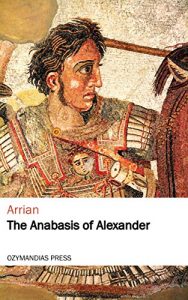All we know of Arrian is derived from the notice of him in the Bibliotheca of Photius, who was Patriarch of Constantinople in the ninth century, and from a few incidental references in his own writings. We learn from Suidas that Dion Cassius wrote a biography of Arrian; but this work is not extant. Flavius Arrianus was born near the end of the first century of the Christian era, at Nicomedia, the capital of Bithynia. He became a pupil of the famous Stoic philosopher Epictetus, and afterwards went to Athens, where he received the surname of the “younger Xenophon,” from the fact that he occupied the same relation to Epictetus as Xenophon did to Socrates. Not only was he called Xenophon by others, but he calls himself so in Cynegeticus (v. 6); and in Periplus (xii. 5; xxv. 1), he distinguishes Xenophon by the addition the elder. Lucian (Alexander, 56) calls Arrian simply Xenophon. During the stay of the emperor Hadrian at Athens, a.d. 126, Arrian gained his friendship. He accompanied his patron to Rome, where he received the Roman citizenship. In consequence of this, he assumed the name of Flavius. In the same way the Jewish historian, Josephus, had been allowed by Vespasian and Titus to bear the imperial name Flavius.
Photius says, that Arrian had a distinguished career in Rome, being entrusted with various political offices, and at last reaching the supreme dignity of consul under Antoninus Pius. Previous to this he was appointed (a.d. 132) by Hadrian, Governor of Cappadocia, which province was soon after invaded by the Alani, or Massagetae, whom he defeated and expelled. When Marcus Aurelius came to the throne, Arrian withdrew into private life and returned to his native city, Nicomedia. Here, according to Photius, he was appointed priest to Demeter and Persephone. He died in the reign of Marcus Aurelius...
Photius says, that Arrian had a distinguished career in Rome, being entrusted with various political offices, and at last reaching the supreme dignity of consul under Antoninus Pius. Previous to this he was appointed (a.d. 132) by Hadrian, Governor of Cappadocia, which province was soon after invaded by the Alani, or Massagetae, whom he defeated and expelled. When Marcus Aurelius came to the throne, Arrian withdrew into private life and returned to his native city, Nicomedia. Here, according to Photius, he was appointed priest to Demeter and Persephone. He died in the reign of Marcus Aurelius...







